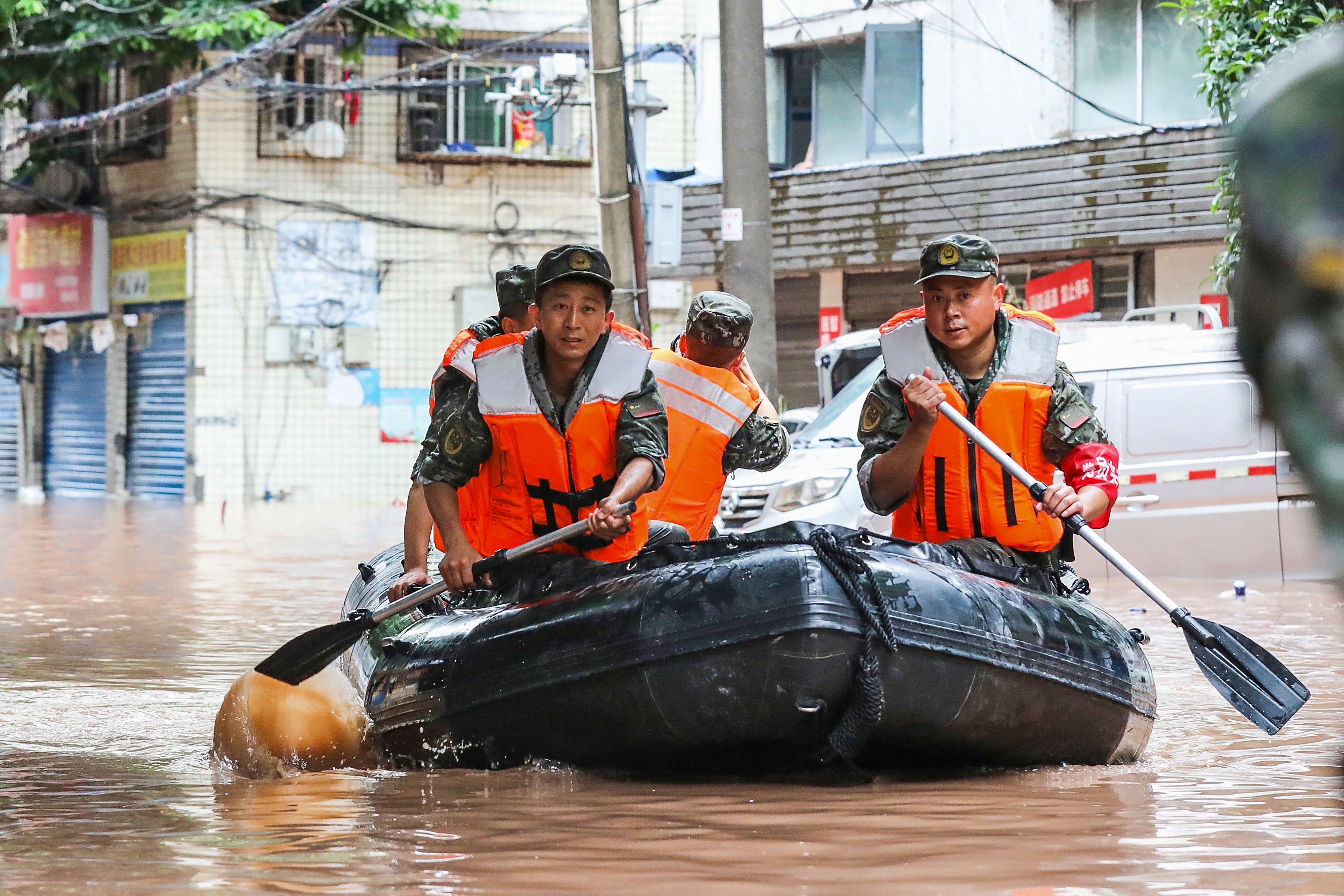15 dead in China as government warns of ‘multiple natural disasters’ in coming weeks
Heavy rains have caused tens of thousands of people to be displaced in central China

Your support helps us to tell the story
From reproductive rights to climate change to Big Tech, The Independent is on the ground when the story is developing. Whether it's investigating the financials of Elon Musk's pro-Trump PAC or producing our latest documentary, 'The A Word', which shines a light on the American women fighting for reproductive rights, we know how important it is to parse out the facts from the messaging.
At such a critical moment in US history, we need reporters on the ground. Your donation allows us to keep sending journalists to speak to both sides of the story.
The Independent is trusted by Americans across the entire political spectrum. And unlike many other quality news outlets, we choose not to lock Americans out of our reporting and analysis with paywalls. We believe quality journalism should be available to everyone, paid for by those who can afford it.
Your support makes all the difference.Severe rainfall and flooding has killed at least 15 people in China, with four people missing and over thousands evacuated in recent days amid warnings of “multiple natural disasters” hitting the country this month.
Southwest China has been lashed by heavy downpours, with four counties in Chongqing city issuing the highest level red alert warnings this week.
Fifteen people have been reported dead since Monday in the fourth largest Chinese city, while four were missing as of early Wednesday, the state-run Xinhua news agency reported, citing authorities.
Heavy rains have caused tens of thousands of people to be displaced in central China, while infrastructure, including bridges, has been destroyed.
Videos on social media showed raging rivers in towns and cities and people being evacuated through waist-deep water. One clip showed rescuers breaking through a window security mesh to reach people trapped in an apartment.
Another alarming video showed a building in southwest Chongqing collapsing into a powerful torrent. The national broadcaster also reported the collapse of a railway bridge weakened by floodwaters in the same region.
China’s president Xi Jinping has called authorities to “give top priority” to the safety of residents and asked ministries, including flood control and emergency management authorities, to coordinate the response effort.
China has been facing a dramatic swing between extreme temperatures in recent days, with back-to-back heatwaves and thunderstorms hitting various parts of the country.
Chinese meteorological authorities warned that this July, China can be hit by “multiple natural disasters”, AFP reported, including floods, severe convection weather, typhoons and high temperatures, bringing further misery due to extreme weather conditions.
The latest round of heavy rain has disrupted the lives of more than 130,000 people and damaged more than 7,500 hectares of crops.
In Wanzhou district alone, floods have caused 227.8m yuan (£24m) worth of economic losses, state broadcaster CCTV said.

The neighbouring Sichuan province has also been severely affected, with over 460,000 residents feeling the impact of the heavy rains. No casualties have been reported so far in the province, according to state media, but over 85,000 residents have been displaced.
The flood warnings have now extended to the northern provinces of Liaoning, Jilin, and Heilongjiang.
In recent days, China has been grappling with extreme heat and recorded its hottest June since 2000, with Beijing enduring temperatures over 35C for 14 consecutive days, the highest number of scorching days since records began in 1961.
Heatwaves have already strained power grids and water security with increasing demand for electricity to cool homes, offices and malls, triggering blackouts. Factories have had to shut down when power demand surpasses supply.
However, China’s efforts to support base load power demand involved approving new coal mines and coal-fired power plants, despite global push to reduce coal and gas which are responsible for the majority of greenhouse gas emissions.

The rising temperatures have sparked concerns of a repeat of last year's severe drought, which affected millions of hectares of crops and resulted in significant economic losses.
The extreme weather in China comes as temperature records are being globally shattered with several countries in Asia, Africa Europe and the Americas experiencing unusual levels of heat.
The world recorded its hottest every day on Monday, with scientists warning that the temperature record could be broken once again in the coming days driven by worsening global heating and El Nino phenomenon in the Pacific, associated with hotter temperatures.
Experts said while El Nino naturally drives temperature extremes, its impact is now being felt on top of the already exacerbated climate crisis with average global temperatures having increased by 1.2C since the industrial era.
In 2023 so far, several temperature records have been shattered globally. The UK recorded its hottest June this year, according to Met Office, while an extreme marine heatwave developed around the country which has shocked scientists and posed severe threat of sea life.
In the Antarctic region, temperatures soared to unprecedented levels, with several stations registering positive temperatures despite it being the winter season.
The southern parts of the US and Mexico are already reeling under extreme temperatures with over a hundred deaths recorded so far. Canada is still reeling from its raging wildfires, the highest it has faced ever, which blanketed large swathes of the US in hazardous smoke.
Meanwhile, heat in Asia also started earlier than usual this year, with over a dozen countries, including China, India and Thailand recording extreme April temperatures. Scientists said the heatwave was made 30 times more likely due to the climate crisis.
Along with China, India has also experiencing a more intense humid heatwave in its eastern parts with “significantly higher than the normal heat wave days observed” in the country, according to the Indian Meteorological Department.






Join our commenting forum
Join thought-provoking conversations, follow other Independent readers and see their replies
Comments